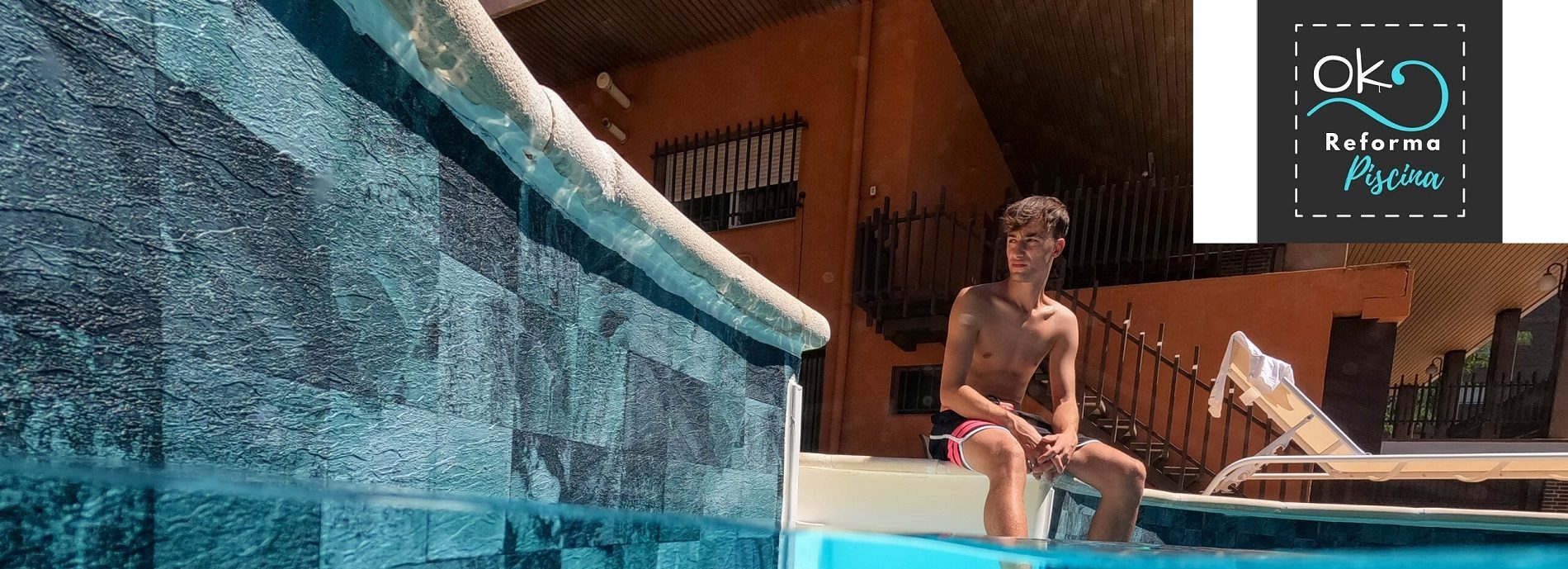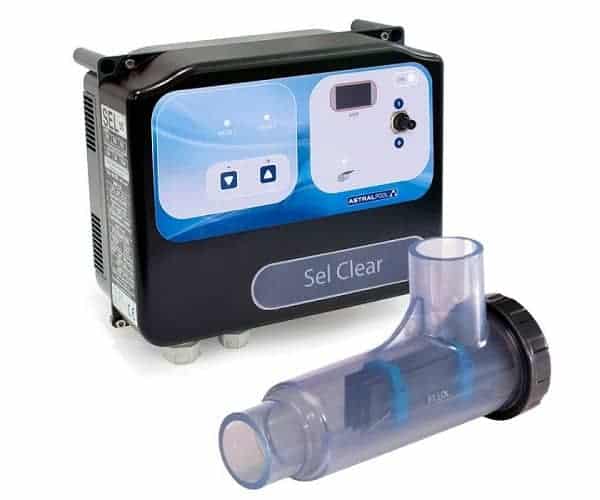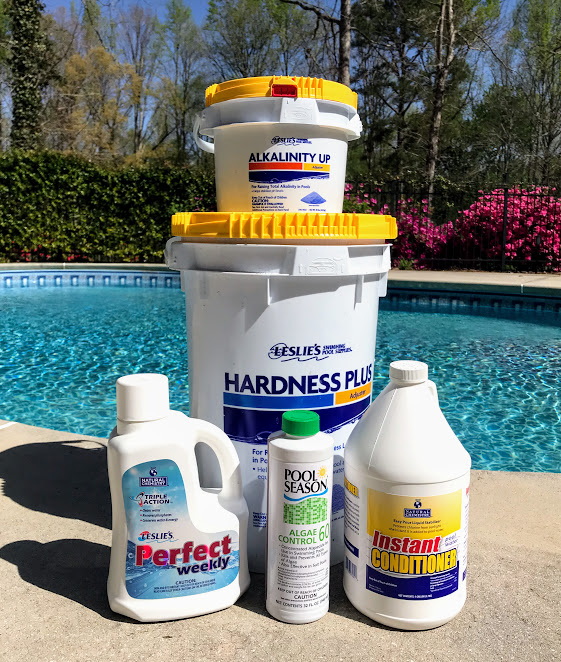
Table of contents of the page
Within the pool water maintenance guide and Effects, measurement, treatments and elimination of lime in swimming pools, then we offer you an article on: Ingenious tips to increase the hardness of your pool water.
Do you have a swimming pool, but the water doesn't seem hard enough? The hardness of your pool water may not be adequate. Not having enough calcium in the pool can lead to algae growth problems, pH imbalance, damage to surfaces and fixtures caused by corrosion, cloudy water, and potential health problems. Read on for clever tips on how to increase water hardness. of your pool so that no bather has to worry about unpleasant surprises when taking a dip.
Ingenious tips to increase the hardness of your pool water
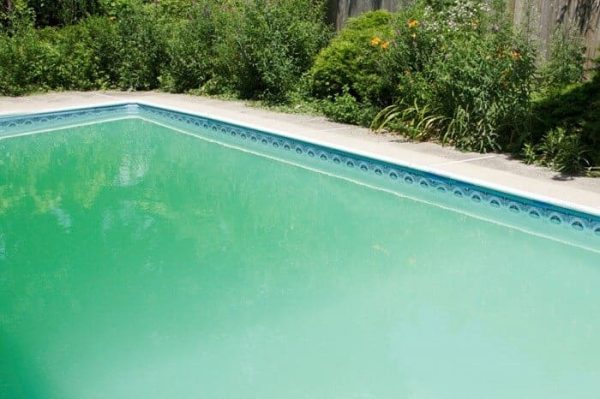
Keep your pool water crystal clear with these simple tips
Do you have a pool at your house? If so, you know that keeping water clean and clear is a constant battle. One of the ways to make it harder for algae and other contaminants to take hold is by increasing the hardness of your pool water. In this blog post, we will talk about seven tips to help you achieve this
If you're like most people, keeping your pool water clean and clear is a constant battle. One of the ways to make it harder for algae and other contaminants to take hold is by increasing the hardness of your pool water. In this blog post, we will talk about seven tips that will help you achieve this
Recommended pool water hardness level
One of the most important ways to maintain your pool is to keep the water hardness levels balanced.
Why the hardness of pool water is important
The hardness of pool water is important because it helps keep the water clean and clear. Hard water contains calcium and magnesium minerals that can clump and form deposits on pool surfaces, which can be difficult to remove. A high level of hardness also means that the water is more alkaline, which can irritate the skin and eyes.
So, water hardness is a measure of the minerals dissolved in the water, and too much or not enough of these minerals can cause problems. If the water hardness is too low, it can be corrosive and damage pool surfaces and equipment. If the hardness of the water is too high, it can cause limescale to build up on surfaces and make it difficult for the water to filter.

In general, it is important to monitor both the pH and hardness of your pool water to ensure they are balanced.
With proper testing and maintenance, you can ensure that your pool remains a safe and healthy environment for everyone who enjoys it!
There are local laws for pool hardness levels
It is important to note that local laws may require you to keep your pool's hardness levels within certain limits, so you may need to adjust your hardness levels accordingly.
Ideal Pool Water Hardness Levels

Pool hardness value range with coatings other than liners 150 and 2255 ppm.
- For these types of pools, having a slightly higher level of calcium in the water can actually help cause damage to the liner from minerals and chemicals; producing stains or discoloration on the coating.
Ideal pool water hardness value with traditional coating: between 150 and 250 ppm per million.
In swimming pools with vinyl or fiberglass liners, water with a low LSI level can deteriorate the surface.
- Pool hardness value range with liners other than liners: For pools with liners without liners, the ideal water hardness range should be between 150 and 250 parts per million.
- The upper end of this range is because pools lined with traditional materials are more resistant to calcium than those with liner, vinyl or fiberglass.

How to check the hardness of your pool water
If you have a swimming pool, it is important that you check the water hardness regularly.
Water hardness is a measure of the amount of minerals dissolved in the water. Too much hardness can cause problems such as scaling on pool surfaces and equipment.
There are several ways to check the hardness of your pool water. You can purchase a testing kit at a pool supply store or you can have your water tested by a professional.
Test kits typically come with a strip that is dipped into water and compared to a chart to determine the hardness level. If you are going to test the water yourself, be sure to follow the instructions carefully.
Another way to check the hardness of your pool water is to take a sample of the water to a professional who will analyze it for you. This is usually more accurate than analyzing it yourself, but it will cost you more money.
Whichever method you choose, be sure to test the hardness of your pool water regularly to keep it at a safe level.
Price of strips to check the hardness of pool water
Strips to Test Water Hardness – Individually Packaged – for Drinking Water, Ponds, Pools and Aquariums – 10 Units
XIAPIA PH and Chlorine Meter for Swimming Pools Water 6 in 1 PH/Chlorine/Hardness Test Paper Strips Water Alkalinity 100 Pieces Aquarium Test for Drinking Water, Aquariums, Swimming Pools, Industrial, Thermal
1ST TREATMENT HOW TO INCREASE CALCIUM HARDNESS IN POOL WATER
1st Generic treatment to increase pool water hardness with increasing product
1st step to increase pool water hardness: adjust chemical values of the pool water
- First of all, verify that the pH values and the alkalinity are appropriate.
- Then check the calcium hardness values and
- Next, if required, we must weigh the pH and alkalinity ranges before starting.
2nd step to increase calcium hardness: We will clean the bottom and walls of the pool.
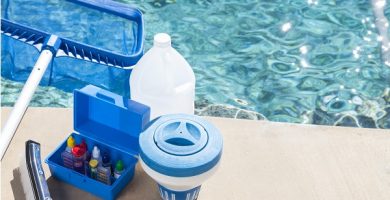
Useful guide to know how to clean the pool

Guide to maintaining a pool with water in perfect condition
3rd procedure to increase the hardness of pool water: Add pool water hardness-raising product

Tips to increase the hardness of your pool water
There are a few things you can do to increase the hardness of your pool water if it is too low. You can add calcium chloride or baking soda to the water. You can also ask your local water company to add calcium to the public water supply before it enters your home, which will then be added to your pool when you fill it.
We insist: Specifically, the chemical product to increase pool water hardness We must use it once the calcium hardness of the pool is less than 175 ppm.
Tips for using a chemical product to increase pool water hardness
- First of all, you have to establish The dose of how much product to increase the hardness of the water is going to be essential based on two factors: Logically, the first agent is considered based on the amount we need to increase until we reach the ideal ppm range of water hardness and then you will have to read the instructions indicated on the chemical label, since not all are the same
- Although, at a generic level, we inform you that Normally you have to add 1,5 kg of product to increase the hardness of 10 m³ of water by 100 ppm (We insist that you never stop consulting the instructions).
- Likewise, it is important to keep in mind that The method must be executed with these patterns: without any bathers, preferably at dusk, ensuring in advance that the day in question does not have a contrary climate, if we use an example: windy day (the product we have just incorporated can take us out of the pool.
- Additionally, We will get as close to the pool as possible and add the chemical, dissipating it evenly distributed throughout the glass..
- In any case, in order to make sure not to exceed the quantity of product, We suggest that you better add it little by little; It is more appropriate to repeat the operation than to overdo it.
- Subsequently, You wait approximately six hours with the filtration equipment on, since the calcium chloride must remain waste in the water. As additional information, I suspect that calcium carbonate does not dissolve easily, so rest assured that if you make a mistake there are many risks of the water becomes cloudy.
- And finally, if necessary, In the event that you have not achieved the suitable values for the hardness of the pool water, you will have to reproduce the entire process described again until you reach them.

Product to increase pool water hardness
What is the pool water hardness increaser?
What is the Product to increase pool water hardness?
- Regarding the chemical product to increase pool water hardness, it is a compound that lor we can find it in granular or liquid format, which, as its name indicates, allows us increase the calcium content of the pool water.
- Recommended for application when the calcium hardness is less than 175 ppm for optimal water treatment, avoiding the aggressiveness of too soft water on the materials that form part of the pool (ladders, nozzles, filter, etc.). A balanced hardness value will also prevent excessive consumption of disinfectant when treating pool water.
- En particular, The objective of the pool water hardness increaser is to reduce the aggressiveness of soft pool water on the metallic materials that exist in the pool.
- Likewise, this chemical product to increase pool water hardnessa is ideal for: all types of pools
Advice on use of pool water hardness increaser
- Tips for use for the product to increase calcium hardness in pool water: add 1,5 kg of product to increase the hardness of 10 m³ of water by 100 ppm. The hardness of the water must be between 175 and 300 ppm and its control will be carried out using an analysis kit once a month.
Buy chemical product: Pool water hardness increaser
Pool hardness increaser price: Solution for: increasing pool water hardness
2nd Treatment: how to increase the calcium hardness of the pool
2º How to raise the calcium level in your pool with calcium hypochlorite

Treatment to increase pool water hardness with calcium hypochlorite
To increase the hardness of your pool water, you will need to use calcium hypochlorite.
This chemical compound is available in solid granule or powder form, and is also known as bleaching powder. Calcium hypochlorite works by releasing chlorine into the water, which raises the pH level and increases the calcium content in the water.
- When using calcium hypochlorite to increase water hardness, it is important to follow all directions on the product package.
- You should add the product slowly while removing the bottom of your pool with a long-handled brush or the brush attachment on your pool vacuum.
- It is best to frequently check your pool's pH levels during this process to ensure your pool water stays in the ideal range of 7,4-7,6.
- In addition to using calcium hypochlorite, it is also important that you regularly maintain your pool's filtration system and vacuum the bottom of your pool regularly to remove any dirt or debris that may affect the balance of the water. This will help keep your pool's pH levels constant and within the optimal range.
Note on the use of calcium hypochlorite for swimming pools
- Be sure to take all necessary safety precautions when handling calcium hypochlorite and avoid contact with skin and eyes.
- Wear appropriate protective equipment, such as gloves, goggles, and masks, while working around this chemical to ensure your safety.
- Also, make sure your pool's chlorine level does not exceed 3 parts per million (ppm) by checking it regularly with a test kit.
- Finally, properly store all chemicals in a cool, dry place, out of the reach of children and pets. Follow these steps carefully to stay safe while increasing the hardness of your pool water!
Buy calcium hypochlorite for swimming pools
By following these steps, you can safely and effectively use calcium hypochlorite to increase the hardness of your pool water. With regular maintenance and filtering, you can enjoy a healthy and clean swimming experience right in your own backyard!
3rd Treatment to increase pool calcium hardness
3º How to increase the hardness of pool water with calcium chloride powder
Powdered calcium chloride can be a good way to increase the hardness of your pool water.
When added to water, it raises calcium levels and creates a more conducive environment for swimming. Here's how to do it:

- Test your pool water before adding calcium chloride powder. Check the pH level, alkalinity and total hardness to determine how much powder you need to add
- Make sure you have enough powdered calcium chloride on hand – typically 1 pound per 10.000 gallons is enough for a small pool – and dissolve it in a gallon of hot tap water (or warm rainwater) before adding it to the pool.
- Slowly pour the dissolved powder into your pool water. Avoid adding the powder directly to the skimmer or anywhere with moving water, as it could cause an imbalance in other parts of the pool.
- 4Spread the powder over a wide area and sweep it across the bottom of the pool while gently stirring the bottom with a pole. This will help ensure that all areas of your pool are evenly affected by calcium chloride.
- 5Recheck the pH levels after about 24 hours to ensure you have achieved the desired results. If necessary, repeat steps 2 to 5 until optimal hardness is reached
Adding calcium chloride powder to your pool can quickly and effectively increase water hardness and make it easier to maintain your pool's health. With proper care and maintenance, you can enjoy a more comfortable and long-lasting bathing experience.
Buy calcium chloride for swimming pools
Calcium chloride price for swimming pools
Video how to increase pool water hardness with calcium chloride powder
4th Treatment how to increase the hardness of the water
4º How to increase the hardness of pool water naturally thanks to salt
How to increase the calcium hardness of the salt pool?
Adding salt to a saltwater pool is a good way to increase the hardness of the water.
By doing so, your pool's calcium and magnesium levels will increase, creating a more balanced bathing environment. This process can be done manually by adding bags of salt directly to the pool or through an automated salinization system.
- Both methods are effective ways to increase hardness, however it is important to follow the instructions carefully and only use high quality salt designed specifically for pools.
- Doing so will ensure that your pool's pH and other chemical levels remain healthy and safe for swimmers. After all, no one likes swimming in hard, uncomfortable water! With just a little effort, you can have crystal clear water with perfect hardness levels that make swimming an enjoyable experience.
- Having the correct level of hardness in your pool is important to maintaining a healthy and balanced environment.
By adding salt, you can ensure that your pool remains at optimal levels for bathing and comfort. So take some time to evaluate the hardness of your pool water and, if necessary, add salt to achieve the perfect balance!
Procedure to raise calcium in the pool with salt
When water extracts calcium from the walls of a pool, one of the most effective ways to increase its hardness naturally is through solar purification of salt water.

This method involves placing several specially designed bags of salt in a pool and then exposing them to direct sunlight for several hours.
- The sun's ultraviolet rays break down the chlorine molecules in the salt, releasing ions that remain in solution and react with the minerals found in your pool water.
- This causes an increase in alkalinity and pH levels, as well as an increase in total dissolved solids (TDS), all of which provides an additional layer of protection against corrosion and staining caused by calcium deposits.
- As this process continues over time, it can help maintain the overall health of your pool while ensuring that your water remains balanced and safe for swimming. For best results, it is recommended to follow the manufacturer's instructions for proper use of solar purification systems.
Additionally, adding a pool sequestrant regularly can also help reduce calcium buildup on your pool walls by preventing it from binding with other minerals and forming deposits.
- Sequestering agents essentially act like magnets, attracting particles to each other so they are easier to remove when backwashing or cleaning your filtration system. This will not only keep your water clean, but will also prevent unsightly stains from appearing on your pool walls due to calcium buildup. And while these products may cost extra, they are well worth their weight in gold when it comes to keeping your pool running smoothly and efficiently.
Lastly, it is important to pay close attention to water chemistry and keep your pool's total dissolved solids (TDS) within a certain range.
- If the TDS level is too low, calcium can be extracted from the walls, causing an increase in hardness.
- On the other hand, if TDS levels are too high, salt can also begin to form deposits on the walls of your pool.
- Therefore, it is essential that you maintain proper water chemistry so that your pool functions optimally and remains looking good over time.
- By following these simple tips you can take steps to keep the hardness of your pool water at an optimal level naturally.
